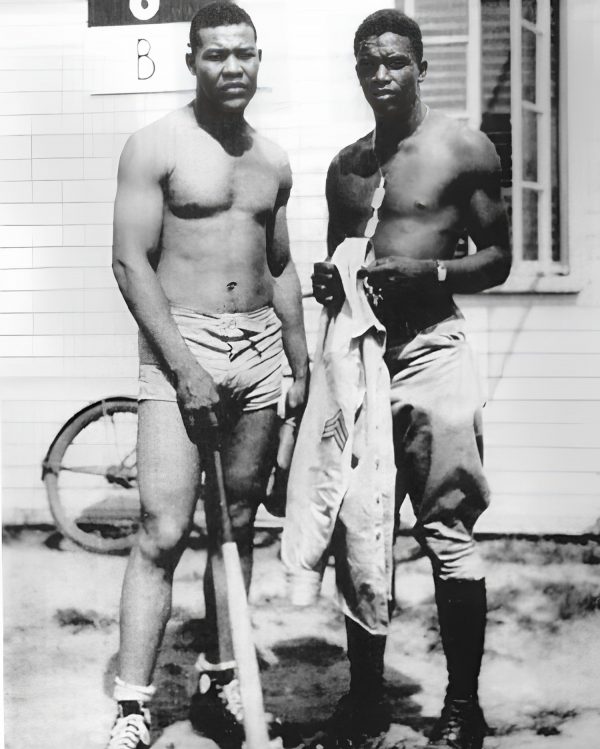World War II Chronicle: June 30, 1943
Click here for TODAY’S NEWSPAPER
American soldiers and Marines have landed on an island named Rendova, about 150 miles west of Guadalcanal… Sgt. Joe Louis has requested a transfer to the military police (see bottom of front page). The heavyweight champion is currently serving as a cavalryman at Fort Riley, Kan…

Page two reports that the 94th Fighter Squadron, formerly commanded by Eddie Rickenbacker during the First World War, is now the Army Air Force’s top-scoring outfit. Capt. George W. Sutcliffe (one victory) hands off command of the Hat In The Ring Squadron to Capt. Otto H. Wellensiek tomorrow. Wellensiek was a lawyer before the war and just bagged two enemy planes this week. Speaking of Rickenbacker, he departs Moscow today for a visit to the front lines before returning from his overseas trip (page three)…
George Fielding Eliot column on page eight… Sports begin on page 44. Former Washington Nationals infielder Bob Repass is joining the Army.
Roving Reporter by Ernie Pyle
NORTH AFRICA — (by wireless) — Our last day was as interesting as any one of the whole trip. We took off early from Tripoli, and most of us were glad to get on our way. Fighting was then still going on in Central Tunisia, and the Luftwaffe was active, so we made a wide circle around to the south.
We flew for many hours. The air was bitterly rough, and it seemed to us we would never get anywhere. We were over the Sahara, and I have never seen desert so utterly void of anything as the desert that was then beneath us. It was the billowing, spaceless kind of desert you see in the romantic movies — yellow and luscious enough to eat. It was truly beautiful in a ghastly, naked sort of way. Down among those rippled dunes no life could long exist.
Once I walked up into the cockpit, Liet. Richard Litsey, Jr., of Sherman, Texas, was flying the plane, and he said:
“How are you going to describe what this looks like?”
I told him I didn’t think I could describe it, and he said he too felt completely incapable of picturing it to anybody else. Then he aid:
“Let’s go down and take a good look.”
And down we started. The other passengers were either sick or asleep and I’m sure it didn’t help their repose when we unexpectedly started going down, down, down over that remote, lifeless no-man’s land of infinite sand. We went down until we were only a few feet above the ridges of the dunes, and down there we discovered to our amazement that these dunes were sometimes two and three hundred feet high. Their rippled sides were so beautiful they made you feel sad.
Four hours we flew over this lovely, tortured segment of the world. Finally we came out into the suburbs of the desert — foothills and occasional oases. I began to recognize it as country I had traveled over by truck when we went to search for some crashed planes last winter.
And then at last we flew over the very airdrome where I had spent so many weeks at the beginning of the year. It looked lonely and forsaken down there now — for we had abandoned it long ago, driven out by the continuously flying sand.
At last we came over norther Algeria, and to the last hour of our homeward flight. By now it was late in the day, and everybody was in a tense, expectant, homecoming spirit. Even the sick ones couldn’t help feeling an animation. The pilots seemed to feel it more than anybody else. They kept the plane only a few feet off the ground, and it seemed we must be going 500 miles an hour. Flocks of sheep ran wildly before us. Arabs stopped their oxen in the fields and ducked as we flew over them. The plane banged and bounced and tore on into the mountain passes ahead of us as though it had its teeth bared.
As I have said before, northern Algeria is incredibly beautiful. Its great ridges and green forests and gentle valleys and white clouds are a divine progeny such as nature seldom conceives. We roared into and through this spectacular beauty — sometimes almost scraping the red roofs of Arab villages perched on nearly inaccessible peaks, sometimes twisting through narrow passes that we passengers swore were not wide enough for our wings, sometimes soaring out over ledges that dropped down thousands of feet and left us suddenly motionless, it seemed, above the patchwork valleys far below.
And finally we came home, or to what we who are no so long out of America have come to call home.
The long peril and agony of travel was over. It was a gigantic relief to feel the ultimate ground underneath us again. We piled out with an inner feeling of accomplishment that practically made us individual heroes to ourselves. We emerged as though expecting some welcoming throng at the airdrome to break into uncontrolled cheers in our honor.
Fortunately no such thing happened. For as I climbed down the ladder I caught a heel on the narrow steps, lost my balance, and fell sprawling into the ground. I tore my pants, and skinned my knee nastily.
It was my only accident in nearly 15,000 miles of travel. But so high were our spirits at being home again that even the burning in my knee felt good.
Evening star. (Washington, D.C.), 30 June 1943. Chronicling America: Historic American Newspapers. Lib. of Congress.
https://chroniclingamerica.loc.gov/lccn/sn83045462/1943-06-30/ed-1/
